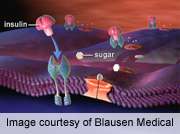Activated carotid bodies key in metabolic disruption

(HealthDay)—Activation of carotid bodies (CB) by insulin may account for increased sympathoadrenal activity that results in insulin resistance (IR) and arterial hypertension, according to an experimental study published online March 25 in Diabetes.
Maria J. Ribeiro, from Universidade Nova de Lisboa in Portugal, and colleagues examined the role of CB in animal models of IR and hypertension and tested whether insulin is a trigger for CB activation.
The researchers found that CB overstimulation seems to be involved in the etiology of IR and hypertension, with increased CB activity seen in IR animal models. Resection of the carotid sinus nerve prevented CB overactivation and was found to prevent diet-induced IR and hypertension. In further experiments, insulin was found to trigger CB activation.
"In conclusion, we propose that insulin-triggered CB activation is responsible for increased sympathoadrenal activity and outflow creating a vicious cycle that culminates in severe IR and arterial hypertension, the core features of the metabolic syndrome and type 2 diabetes," write the authors.
More information:
Abstract
Full Text (subscription or payment may be required)
Health News Copyright © 2013 HealthDay. All rights reserved.

















